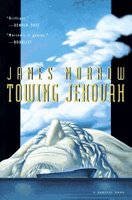This book caught my eye once in a bookstore a few years ago, and I remembered it for so long and meant to read it because the main idea was so strange and unique. God is dead. And his smiling, two-mile-long corpse has fallen into the ocean. The archangels, before they die of terminal empathy, recruit a disgraced oil tanker captain and a Jesuit, backed by the Vatican, to take an oil tanker out and tow God's body to the arctic burial the angels have prepared for him.
It's a pretty bizarre concept for a book. And I was surprised by how quickly I read the book-- partly because Morrow's writing and characters are quite engaging, and partly because I had no idea what would happen next in such a strange story.
Anthony Van Horne is (or was) a captain of ultra-large oil tankers (the angels claim he's the best captain in the world), and the son of a great captain, but a few years back he was partly responsible for a terrible oil spill. Although not held legally responsible, he lost his captain's license and is wracked by guilt-- he dreams of birds and marine animals covered in black oil, and he is constantly washing himself because the oil always comes back.
Van Horne is joined on this venture by Thomas Ockham, a Jesuit professor and scholar who has worked to integrate Christian faith with philosophical and scientific principles. Together, they recruit a crew to staff their ship (the Valparaiso, which Van Horne was captaining when the oil spill happened) and set off to find God's body. And, of course, not everything goes according to plan. Once they find the body, the crew has to know what is going on (they take shifts guarding the corpse from being eaten by sharks and the like)-- and there's a diverse range of people, including a Jew and an evangelical Christian who can't handle it. Eventually most of the crew mutiny-- because they feel no one is watching any more, they start misbehaving in all kinds of terrible ways. Even Father Ockham, to some extent, gets taken up by this "Idea of the Corpse," as he calls it. At this time, they are stranded on an island, and the mutineers blow all the food in their wild partying-- and eventually, Van Horne and Ockham turn to God's corpse to provide food for the starving crew. There's a kind of reverse Eucharist, where God's literal flesh and blood becomes food and drink for them-- and rather than sacrilegious, I thought it was actually kind of beautiful, because they were completely sustained by God.
Along the way, they also rescue an atheist biology professor (who, it so happens, used to write off-Broadway plays, many of them based on Biblical ideas). She manages to get a secret message off to her atheist fiancé so that they can intercept and sink the corpse, since a male corpse would be a blow to feminism. Ultimately, this leads to a rather crazy sea battle, and the interesting development that both the Enlightenment society and the Catholic church want the same thing-- they want to destroy God's body and hide the evidence: the church, because they don't want the world to know God is dead, and the atheists, because people won't properly understand the meaning of the body and will take it as proof of God.
While this was a fascinating book, ultimately I found it a little disappointing. The angels told Father Ockham that by the end of the trip, he would figure out why God died. When he finally finds out that the whole towing & burial was the angel's idea, his conclusion was that God wanted the world to know he was dead, in order that humanity could grow up and be independent. The angels also told Van Horne that he would receive forgiveness from his father, and be able to get past his guilt for the oil spill-- but this doesn't quite happen either.
Ultimately, I think the book is unsatisfying because Morrow has no answers, and has rejected the answers of Christianity. Van Horne's guilt and constant, almost ritualistic attempts at self-cleansing are so clearly a spiritual struggle-- but Morrow's answer seems to be that there is no forgiveness; you just live with it as best you can. Likewise, Ockham's understanding of the reason for God's death seems pretty flimsy to me-- and the insignificance is underscored by the fact that they eventually decide not to exhume the body and show the world; instead the story only makes it out to the world via Van Horne's diary, published as the fictional Gospel according to Popeye.
| Title: | Towing Jehovah |
|---|---|
| Author: | James Morrow |
| Date published: | 1994 |
| Genre: | Fantasy |
| Number of pages: | 371 |



0 comments:
Post a Comment